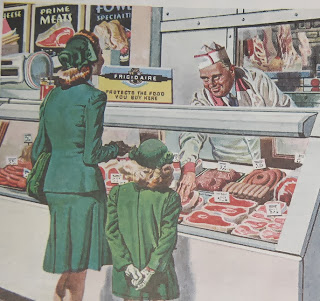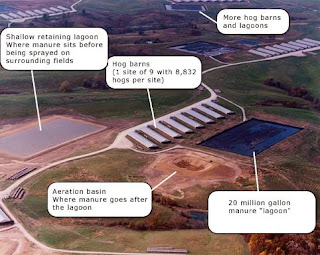Where to go and what to look for when you're buying meat!
The holidays are coming up soon! What are you going to cook for your dinners? For most homes in the US, the centerpiece of holiday dinners is a roast of some sort - roast turkey, beef roast, rack of lamb...however, not all of us know what to look for when purchasing meat. What is good for the animal and the environment, as well as for me and my family? Here is some basic info and help in defining some of the "buzz words" you see (i.e.: CAFOs, organic, grass-fed). Don't let buying meat be an added stress to your holidays. Explaining your "it's complicated" relationship status to your uncle you haven't seen in a year is stressful enough.
 |
| Happy, free-range chickens find all kinds of bugs in grass! |
Why is what the animal eats important?
"You are what you eat" applies to animals, too. Just like humans, everything an animals eats goes through the bloodstream and into every cell in their bodies. GMOs, hormones and antibiotics have the same affect on animals as they do on humans. If a cow eats corn that has been genetically modified, those organisms make their way into the fat and muscle tissues that we eat. (Here are some helpful links on GMOs, hormones and antibiotics if you want more info on how they affect animals, humans and the environment.)
What should animals be eating? Each animal has evolved and bread to eat certain things. With cows, for example, they have been eating grasses for millennia, but many confined animal feeding operations (CAFOs) have been feeding cows corn. Though, this adds a lot of fat to the muscles (which is a good thing for flavor), the enzymes and microbes in cow's stomachs cannot correctly process corn. It makes them sick, then they are given antibiotics, then they develop immunities to those antibiotics, then they get sick again and we're eating sick animals...it's an ugly cycle. Here is what animals should be eating:
Cows: grasses
Sheep: grasses
Poultry: grains, grass, bugs
Pigs: "slop"- roots, fruits, veggies, plants, grains...just about anything. Pigs are the garbage disposals of farm animals.
Meat that is "certified organic" comes from animals that have been fed an organic diet with no GMOs, antibiotics or hormones. This is what you want to look for. However, as I have mentioned before, not all small farms can afford to become certified organic. So, talk to your farmer to find out what their practices are. Butchers always know what's happening with their meat sources as well.
What are CAFOs?
Confined Animal Feeding Operations = no bueno. This is where all the ugly stuff happens: hormones, antibiotics, GMOs, animal maltreatment, e-coli, toxic waste & poop lagoons. Yes, poop lagoons. This is where thousands and thousands of animals are crammed together, walking around in their own crap and then get slaughtered for our hamburgers. In my opinion, there is nothing good about a CAFO.
 |
| Temple Grandin in her natural habitat. |
What about animal treatment?
This is where it becomes a matter of personal conviction, mostly. One point I will make, is that if an animal is under stress, they release toxins into their bloodstream, which makes the meat taste bad and is not that great for us to be ingesting. Temple Grandin is the patron saint of animal slaughterhouses. She invented humane livestock handling procedures that are used today. (You should watch the movie about her, it's awesome!)
So, where do I find meat that doesn't have all the bad stuff?
 |
| I think Mr Butcher has the hots for mom! |
Local Butcher - The "local butcher" is different from your chain supermarket butcher at Fred Meyer or Publix. While, most supermarkets these days will carry organic meat options, they are very limited and are almost always imported from far away. The local butcher I'm talking about may be a tiny little hole-in-the-wall shop that specializes in local products. Do an internet search for butchers in your local area. The benefit of going to a smaller butcher shop is that they can tell you all about where your meat came from, how it was raised and what it was fed. If you are in a remote town you may not have a local butcher, but there are other options...
Farmer's Market - Sometimes local butchers or farmers set up a booths at the local farmer's market. They'll have a smaller selection to sell (usually cured or frozen), but from there you can find out where their farm or brick and mortar shop is located and what other items they sell.
Local Farms - This requires the most work, but it will be worth it, I promise! You're going to have to do an internet search for local farms in your area that raise animals (or ask around at the farmer's market). Local Harvest is a great resource to get you started. This is the best way for you to get the inside scoop on animal care - you get to talk one-on-one with the farmer and ask them all the questions your heart desires about their practices. And if you have trust issues, you can even go and visit the farms, pet the animals and even name your dinner (just kidding, that is not recommended).
The cost per pound for buying retail meats vs. purchasing a whole animal is significant. Buying meats retail can cost upwards of $15-$20 per pound whereas the cost of whole animals is $5-$7 per pound. If that doesn't convince you, nothing will.
Depending on the farm, if you're purchasing larger livestock you can choose to buy a whole, half or quarter animal (I've had groups of friends all pitch in for a whole cow and divide it between everyone). Just a word of warning if you purchase a whole animal for yourself - unless you're feeding a whole village in one night, remember how big a cow is and think about the freezer space you're going to need.
That's the gist of it...
If you don't want nightmares and panic attacks from worrying about your unborn children having three eyes from you eating McDonalds when you were a broke college student, then refrain from investigating any farther on these subjects; I'm like your mom who covered your eyes in the movie theater during the sex scenes - you don't need to see it.
So what's for dinner? A delicious turkey who spent it's life frolicking in a picturesque field with all his best friends, or an E-coli infested Franken-Bird? The blood is off my hands.
*all photos in this post were found on the internet

No comments:
Post a Comment